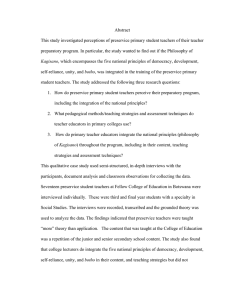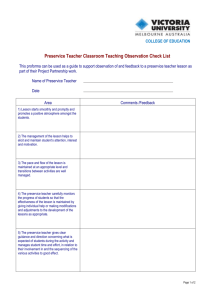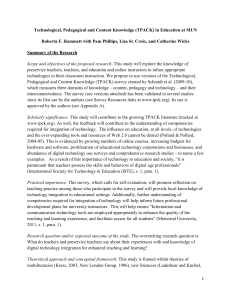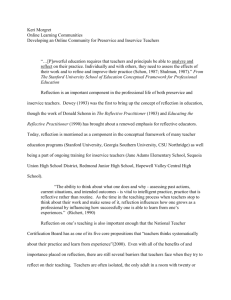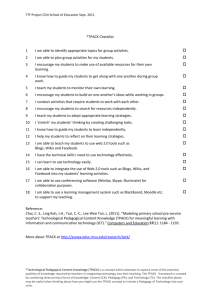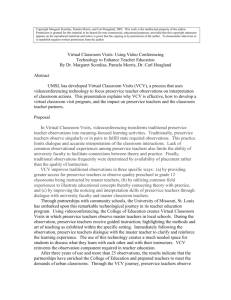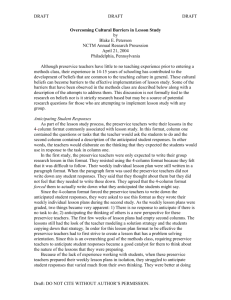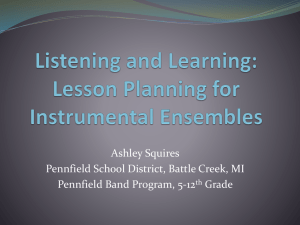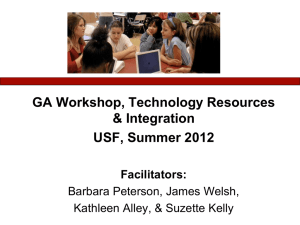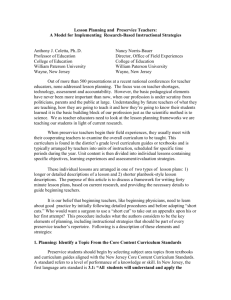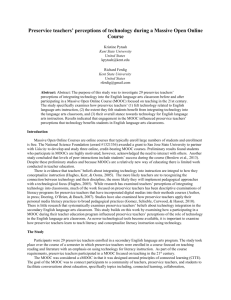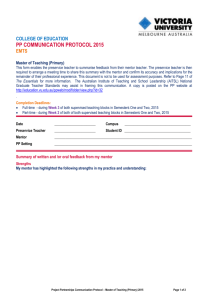The impact of field experience in technology
advertisement
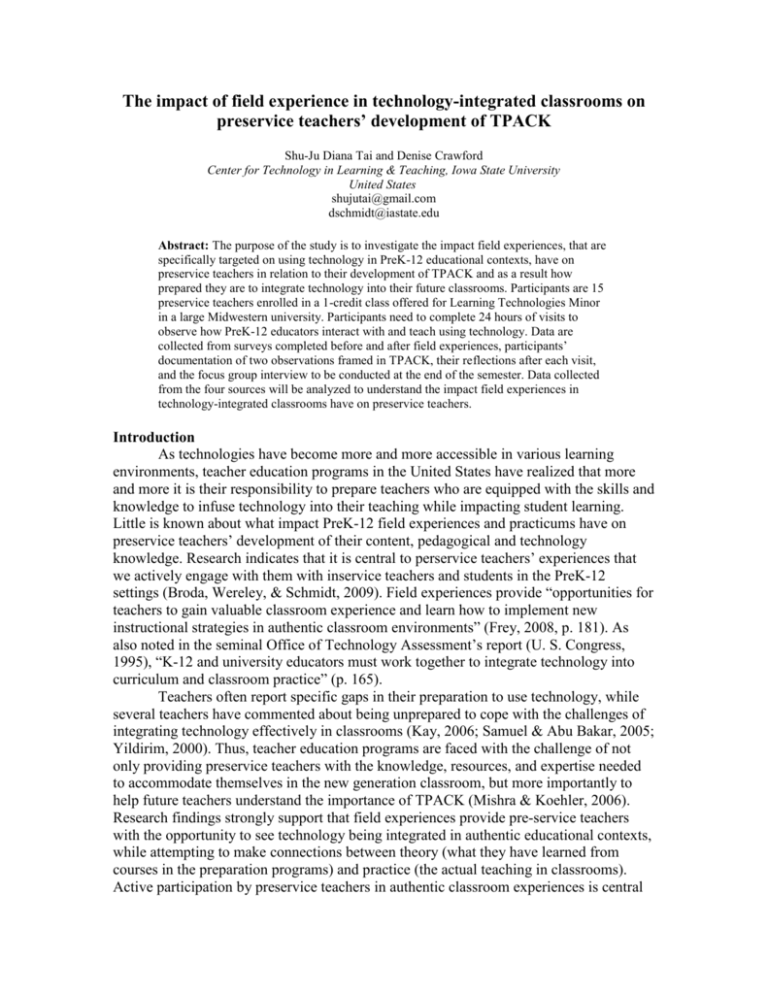
The impact of field experience in technology-integrated classrooms on preservice teachers’ development of TPACK Shu-Ju Diana Tai and Denise Crawford Center for Technology in Learning & Teaching, Iowa State University United States shujutai@gmail.com dschmidt@iastate.edu Abstract: The purpose of the study is to investigate the impact field experiences, that are specifically targeted on using technology in PreK-12 educational contexts, have on preservice teachers in relation to their development of TPACK and as a result how prepared they are to integrate technology into their future classrooms. Participants are 15 preservice teachers enrolled in a 1-credit class offered for Learning Technologies Minor in a large Midwestern university. Participants need to complete 24 hours of visits to observe how PreK-12 educators interact with and teach using technology. Data are collected from surveys completed before and after field experiences, participants’ documentation of two observations framed in TPACK, their reflections after each visit, and the focus group interview to be conducted at the end of the semester. Data collected from the four sources will be analyzed to understand the impact field experiences in technology-integrated classrooms have on preservice teachers. Introduction As technologies have become more and more accessible in various learning environments, teacher education programs in the United States have realized that more and more it is their responsibility to prepare teachers who are equipped with the skills and knowledge to infuse technology into their teaching while impacting student learning. Little is known about what impact PreK-12 field experiences and practicums have on preservice teachers’ development of their content, pedagogical and technology knowledge. Research indicates that it is central to perservice teachers’ experiences that we actively engage with them with inservice teachers and students in the PreK-12 settings (Broda, Wereley, & Schmidt, 2009). Field experiences provide “opportunities for teachers to gain valuable classroom experience and learn how to implement new instructional strategies in authentic classroom environments” (Frey, 2008, p. 181). As also noted in the seminal Office of Technology Assessment’s report (U. S. Congress, 1995), “K-12 and university educators must work together to integrate technology into curriculum and classroom practice” (p. 165). Teachers often report specific gaps in their preparation to use technology, while several teachers have commented about being unprepared to cope with the challenges of integrating technology effectively in classrooms (Kay, 2006; Samuel & Abu Bakar, 2005; Yildirim, 2000). Thus, teacher education programs are faced with the challenge of not only providing preservice teachers with the knowledge, resources, and expertise needed to accommodate themselves in the new generation classroom, but more importantly to help future teachers understand the importance of TPACK (Mishra & Koehler, 2006). Research findings strongly support that field experiences provide pre-service teachers with the opportunity to see technology being integrated in authentic educational contexts, while attempting to make connections between theory (what they have learned from courses in the preparation programs) and practice (the actual teaching in classrooms). Active participation by preservice teachers in authentic classroom experiences is central to the process of preparing preservice teachers who develop deep thinking and reflection about their learning and teaching, especially when thinking about the interplay between content, pedagogy and technology (Mishra & Koehler, 2006). Thus, the purpose of the present study is to investigate the impact field experiences, that are specifically targeted on using technology in PreK-12 educational contexts, have on preservice teachers in relation to their development of TPACK and as a result how prepared they are to integrate technology into their future classrooms. Methodology Participants Participants for this study are 15 preservice teachers enrolled in a PreK-12 technology field experience course in a large Midwestern university. An overview of the research study was shared with the students during a scheduled face-to-face meeting during the first week of the semester. It was made clear that participation in the study was strictly voluntary. In other words, participants could decide to withdraw from the study at any time during the semester and their grades for this course would not be affected. The Research Context The field experience course is a 1-credit class that is offered for preservice teachers who are enrolled in a 16-credit Learning Technologies Minor that is offered at this university. The purpose of this field experience is to provide preservice teachers with an opportunity to observe how PreK-12 educators interact with and teach using technology. During the semester, preservice teachers are placed with a classroom teacher, instructional technology coach, or a technology coordinator/director to complete 24 hours contact time with teachers and students in school(s) where they are placed. Requirements for the course include: 1) observe technology being used in educational settings (i.e., classrooms, teacher inservices, etc.), 2) assist cooperating teachers, instructional technology coaches or technology directors/coordinators with using technology, 3) teach curriculum topics using technology, and/or 4) facilitate technology inservices/workshops. Scheduling of these classroom/school visits are negotiated between participants and vary due to individual schedules. Typically, preservice students spend 2 hours per week for 12 weeks in most cases, but some will spend 3 or 4 hours at a time in their placement locations. This research study uses the structure of this course for examining how preservice teachers develop TPACK as a result of these classroom experiences and interactions with teachers and technology leaders in the field. Research Design & Data Analysis As research suggests, effective field experiences should include “components of observation, participation, and meaningful reflection” (Broda et al., 2009). The proposed research study is a mixed methods design where qualitative and quantitative data will be collected through surveys, document analysis of observations and reflections, and a focus group interview with participants. Collectively, the data gathered from the pre- and postsurveys were analyzed quantitatively and classroom observations, reflections, and semistructured focus group interview data were analyzed qualitatively. Preservice teachers were asked to fill out a survey before and after their K-12 field experience. The pre-survey collected information on participants' background information, their self-perceived TPACK, and their expectation of how the field experience would help them integrate technology into their teaching. The post-survey focused on their self-perceived TPACK and the impact that the field experience had on them in relation to if and how the field experience helped them develop TPACK. In addition to the surveys, participants were asked to document two of their observations of their school visits. Participants were provided an observation instrument to document their field experience when observing teachers in classrooms. Moreover, after each school visit, participants wrote a reflection to reflect and identify what they learned during the school visit. They were also asked to read through peers’ reflection posts and provided comments and feedback, which allowed them to have the opportunity to learn from their peers’ experiences. Participants' observation and reflection data were analyzed to help identify the impact of the field experience. Based on the preliminary analysis of the observation and reflection data, researchers identified issues that needed further illustration before the semi-structured focus group interview, which will be conducted at the end of this fall semester. During the interview, pre-determined questions as well as follow-up questions on issues that emerged from the preliminary analysis will be addressed and clarified. Conclusion Results from this on-going study will be presented at the SITE conference. Researchers will continue to collect data this semester and will report findings at the conference. References Broda, M., Wereley, M. & Schmidt, A. (2009). Making Meaning From Field: Using Weblogs, Wikis, and Digital Stories to Debrief Field Placements. In I. Gibson et al. (Eds.), Proceedings of Society for Information Technology & Teacher Education International Conference 2009 (pp. 2754-2759). Chesapeake, VA: AACE. Retrieved from http://www.editlib.org/p/31056. Frey, T. (2008). Determining the impact of online practicum facilitation for inservice teachers. Journal of Technology and Teacher Education, 16(2), 181-210. Chesapeake, VA: AACE. Kay, R. H. (2006). Evaluating strategies used to incorporate technology into pre-service education: A review of the literature. Journal of Research on Technology in Education, 38(4), 383-408. Mishra, P., & Koehler, M. J. (2006). Technological Pedagogical Content Knowledge: A framework for integrating technology in teachers' knowledge. Teachers College Record, 108(6), 1017-1054. Samuel, R. J., & Abu Bakar, Z. (2005). The utilization and integration of ICT tools in promoting English language teaching and learning: Reflections from English option teachers in Kuala Langat District, Malaysia. International Journal of Education and Development using Information and Communication Technology (IJEDICT), 2(2), 414. Yildirim, S. (2000). Effects of an educational computing course on preservice and inservice teachers: A discussion and analysis of attitudes and use. Journal of Research on Computing in Education, 32(4), 479 – 495. U. S. Congress, Office of Technology Assessment. (1995, April). Teachers and technology: making the connection. OTA-EHR-616. Washington D. C.: U. S. Government Printing Office. Retrieved from http://babel.hathitrust.org/cgi/pt?id=mdp.39015034883846;view=1up;seq=3.
